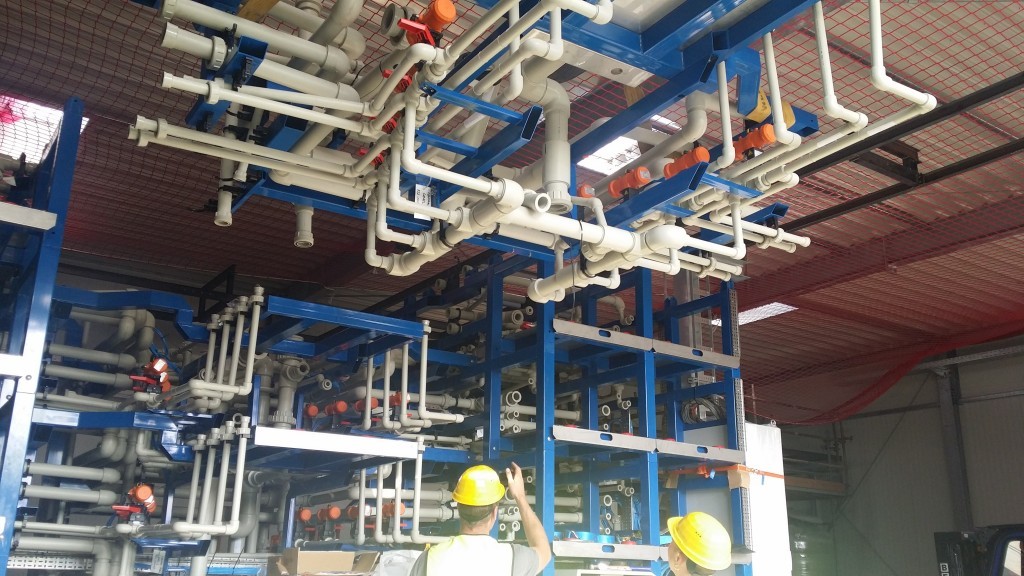
A British company’s revolutionary alkaline fuel system that is commercialising technology first developed in the 19th century is set to commission a pilot project that could launch it into the big league of clean energy producers.
AFC Energy preparing “leave the lab” this month to power up a industrial-scale operation of its unique modular alkaline fuel cell electricity generation later this month with its 240kw Kore system in Germany.
Alkaline fuel cells are extremely electrically efficient. The challenge has been to make the technology cost-effective.
An alkaline fuel cell converts oxygen (from the air) and hydrogen (from a supply) into electrical energy and heat. It’s chemically comparable to a battery that will provide electric power continuously, as long as you feed it air and hydrogen, often found as by-product of other industrial activity.
The process is hardly new. It was invented in the mid-1800s and was used by both the United States and Soviet Union space programmes in the 1950s and 1960s, but a cost efficient industrial application has proved elusive.
AFC has succeeded in making it making modern, modular and more user-friendly. The fuel cell system has been thoroughly reviewed and signed off by German engineers for safety and robustness of design and has already had a test run producing 40 kilo watts in Germany in October.
AFC chief executive Adam Bond is leading the company’s charge to full commercial application with its Kore fuel cell system in Stade, Germany and is looking at tantalising possible large-scale opportunity for deployment in the Middle East in coming months. Other projects are also in the offing in South Korea and Thailand.
The Surrey-based company, which employs around 20 scientists, technicians and engineers, aims to have 1 gigawatt (1,000 mega watts) of fuel cell capacity targeted for development by the end of 2020. Long-term operational data from the Stade Project will demonstrate commercial longevity.
“AFC Energy has re-engineered this proven alkaline fuel cell technology to give it a low lifetime cost of ownership,” explained Bond.
“We have reduced the costs through a lower operating temperature to around 60 degree centigrade.
“We have also been able to remove expensive precious metal catalysts that made the cells so expensive and also eliminated the need to work in a non sterile environment and been able to use everyday plastics.
“The whole system has been built upon simplicity,” he added.
With climate change being discussed by world leaders in Paris this week and calls from people such as Prince Charles, Barack Obama and Bill Gates urging action on alternatives to fossil fuel, analysts have been regularly tipping AFC’s clean technology as a potential “big thing”.
The only by-products are demineralised water and heat – both of which also have commercial uses. Excluding water, an alkaline fuel cell is a zero emission device.
Although currently focused on power generation in the industrial sector, AFC sees ancillary applications for waste water treatment, when combined with electrolysis.
A recent memorandum of understanding with Dubai’s Dutco, will see the company develop fuel cells for the power market in Dubai. The fuel cells are seen as a “win-win” for Dubai and the Middle East power market – the main by-product of electricity products is a substantial supply of low-cost clean water – the one utility prized above oil in the desert states of the United Arab Emirates.
Bond said: “If we can produce water in regions that are in need of water, there’s a very strong argument that it has its own commercial value.
“We’ve been very pleased with the amount of interest we’ve received from potential partners. There’s a very good level of interest, in both the clean energy and the water production. There is tremendous potential.”
Dubai is aiming to spend billions of dollars on generating clean energy, with solar panels installed on the roofs of all buildings by 2030.
The fast-growing desert city-state of 2.4 million, located in one of the hottest regions of the world, uses huge amounts of energy to air-condition its skyscrapers and provide water supplies through desalination.
The authorities plan to establish a $27 billion fund to provide low-cost loans for investors in Dubai’s clean energy sector. AFC Energy is aiming to have a significant part to play in the state’s energy mix.
Dubai aims to obtain 7% of its energy from relatively clean sources by 2020, raising that to 25% in 2030 and 75% in 2050, according to a recent Government announcement. Energy sources will include natural gas, solar, clean coal and nuclear.
